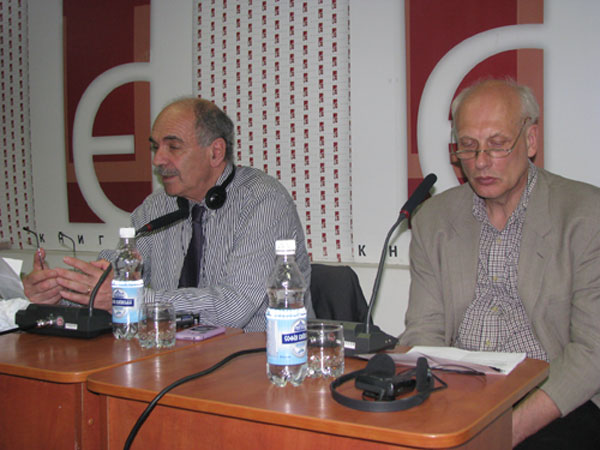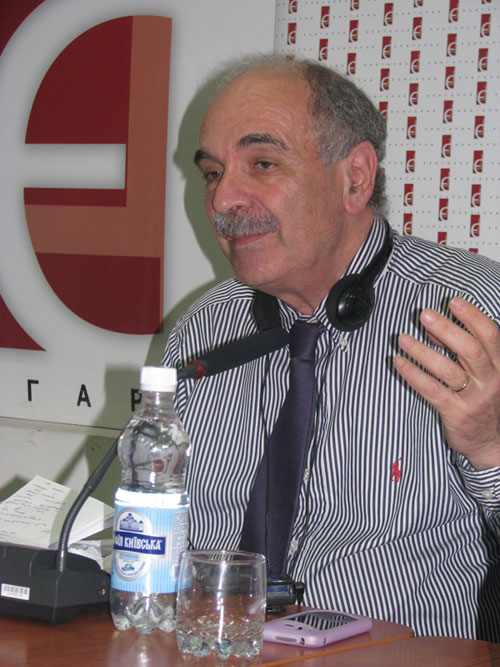Michel Wieviorka is without exaggeration one of the most prominent intellectuals in contemporary France and a scholar of world renown. He has (co-)authored over 30 books. Wieviorka is an expert in a wide range of areas: from racism and xenophobia to terrorism and social cultural movements. At the same time, the French scholar remains incredibly simple and frank in communication and open to the public. On 18 May, Wieviorka spoke in Kyiv at the Ye Bookstore as part of the European Experience: France project.

Photo: Bohdan Oslavskyi
U.W.: Was the victory of a left-wing candidate in the French presidential election caused by the global financial crisis and the rollback of the welfare state, or is it the consequence of some more general rule?
The success of François Hollande is, above all, the defeat of Nicolas Sarkozy. The new leader has been preparing for this mission for a long time. He secured the support of the left-wing forces, above all the socialists and the Greens, and was able to win over the French electorate, but to understand how his victory became possible, we need to take a look at the way the country has developed in the past 40 years. It is now in the financial crisis that started in 2008, but the sources of this crisis in the French context can be traced back to the mid-1960s.
The 30-year period after the Second World War went down in the history of France as “the 30 glorious years”. The republic had a nearly perfect employment rate and was a highly developed industrialised country. Migrants came to work (and not just to live) here. It was a country that had confidence in progress, development, education and social ideas. In the mid-1960s, this model of a welfare state fell apart, causing unemployment, urban and suburban crises and the transformation of immigration. Migrants used to be lonely people who would come to earn money and go back home, but since the second half of the 1960s they would stay in France after losing their jobs and would bring their families over. Most of them were Muslims. Today they are one of our biggest problems. At the same time, the French population grew older, requiring higher government spending on healthcare for the older generation. The welfare state ceased to exist.
It was very hard to overcome these hardships. Some called for neo-liberalism, lower social spending and the privatisation of all state services. This led to great transformations in France. Social inequality between perceptibly deeper. The recent global financial crisis greatly aggravated these processes. This year’s presidential elections were the final phase of the changes I’ve mentioned. Most French citizens voted for Hollande hoping for certain progress in social and economic spheres. All rightists spoke against immigration, claiming that by driving immigrants out of the country we would open the way to ending all hardships and saving national values. Hollande was, on the contrary, very cautious on this issue, avoiding frank conversations on immigration topics. So the French avoided a sharp turn to the right, as the former president suggested, and passed a vote of no-confidence in him at the elections.

Photo: Bohdan Oslavskyi
U.W.: Do you think that the natural and painless integration of immigrants in Western societies is possible, considering the differences in culture, religion, traditions and language?
These topics are being debated in many countries. The participants do not want to look back at the past of those whom we call immigrants today and they also forget their own history. Let us take a distant example. At one point in time, a large number of Ukrainians emigrated to Canada, and now they are full-fledged Canadians. Even though part of these Ukrainians still maintain cultural links to their motherland, they have fully integrated. So people are capable of finding a place for themselves in a different society.
However, Europe has certain apprehensions on this account, especially economic considerations that are increasingly taking the form of cultural phobias. Let us look realistically at the number of immigrants in Western European countries. It is not as great as may seem. Of course, there are differences from state to state. For example, France now receives 180,000 migrants per year. However, we do not know how many people leave. We don’t have these statistics. Evidently, a certain portion of them do leave. Moreover, a significant number of newcomers are students. Studies carried out in Great Britain and Spain proved that the influx of foreign students to these countries fosters the growth of their economies. At the same time, demographic growth in most European states is very slow, and migrants inject “new blood” there. Polls in France prior to the presidential elections showed that those who voted against migrants largely lived in regions where there are very few or no migrants.
The situation with foreigners in our country is not as dramatic as is portrayed. Let me give you one example. There was a lot of noise in France over women wearing veils: some said that migrants are imposing Islam on the French which leads to Islamism and that veil-wearing women are vehicles of this idea. We carried out a social survey and found that a mere 350 women in France wear veils, many of them converts from Catholicism. Most of them did not have either brothers or husbands who would force them to wear these items of clothing. But I do not want to say that the situation is perfect or that we have no problems in this area.
U.W.: Returning to your research, what is the essence of the sociological intervention method you have applied together with your friends and colleagues to study the Solidarity movement in Poland in the 1980s?
This method means studying certain social phenomena together with social actors involved in them. When I studied the activities of the Solidarity movement, we analysed — joined with Polish workers — the key senses of their actions, considered whether this organisation was able to step up the workers’ and social movements in Poland and defined the functions workers performed in industry. We came to the conclusion that it was a democratic and national movement that was in support of the sovereign rights of the Polish people, against Soviet interference in Poland’s domestic affairs, against violence and for free elections, freedom of press and democracy.
Our sociological technique enabled workers to think exactly on this level. We gathered together CEOs of shipyards in Gdansk and suggested that we specialists and they study these issues together. We invited people during these meetings to formulate some thoughts together. At one point, these included Roman Catholic priest Jankowski and Adam Michnik. (The latter contributed to the elaboration of the democratic program of the Solidarity movement.) We worked with groups like that in several Polish cities. After we had held these meetings and discussions, we wrote a book and are now planning to hand over all our research materials to the Institute of Solidarity in Gdansk.

Photo: Bohdan Oslavskyi
U.W.: In your book Society and Terrorism you paint a sociological portrait of terrorism. What are the sources of this phenomenon?
That question follows another: What is terrorism? To come close to its definition, we need to consider the dual nature of this phenomenon. Terrorism is above all a very rational instrument used to achieve a certain goal, a method. At the same time, it includes the idea that there is nothing wrong with killing people. I have studied the activities of left radical terrorists in Italy. They seem to act on behalf of the working class, but the local proletariat does not in any way identify itself with them or their actions. What we have here is a substitution of notions, a distortion. The more people resort to violent actions, the greater changes to the sense of their activity. For example, there is ETA (Basque Homeland and Liberty), a terrorist organisation in Spain which was not originally violent. Under General Franco’s dictatorship, the Basque national movement experienced oppression, but the Basques obtained national-cultural autonomy after Spain became a democratic country in 1975. The more their nationalist demands were met, the greater was the power of terrorists and the more blind was their aggression. Therefore, terrorism combines, on the one hand, rational calculation and, on the other, a loss of sense and touch with reality.
U.W.: Do communism and Muslim terrorism have anything in common?
The common feature is that both communism and Islamism lend sense to terrorism as a political tool and means of struggle. It reaches far beyond the limits of everyday reality. Both camps call for the creation of a different world, resort to hostile rhetoric and aspire to be speaking on behalf of all the entire society, even though it never identifies itself with their terrorist actions.

